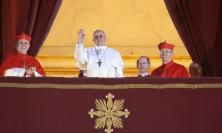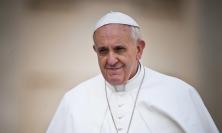James Hanvey SJ, the Society of Jesus’s Secretary for the Service of the Faith, recently spoke at length about Pope Francis’ latest encyclical to Jan Regner SJ, Editor of the Czech Jesuit review, Jezuité. As Thinking Faith reflects this Advent on our Sunday scriptures in the light of Fratelli tutti, we are pleased to be able to publish their interview. In this first instalment, Fr Hanvey reflects on Fratelli tutti in the context of Pope Francis’ other teachings, especially Laudato si’.
There is a remarkable continuity and coherence of thought in all of Pope Francis’ writing and speaking. Although it is often written in a direct and ‘homely’ style, that should not distract us from its freshness, profundity and, in many ways, its prophetic voice. In Laudato si’, there is an extraordinary powerful and evocative imaginative connection drawn between the cry of the poor and the cry of the earth. That opens up a new way of seeing and ‘hearing’ the ecological systems of our common home.
The world is not an infinite and inferior resource to be instrumentalised for our own ends. The creation and manipulation of desires by our economic and information systems is endless. They operate with the relentless logic of our consumerist way of life. They require the endless generation of desire that, in fact, despite giving the impression of freedom of choice and self-expression, imprisons us. In order to do so, we are made prisoners of a sort of ‘ground-hog’ or Beckett-like logic: everything is offered on the basis that it will satisfy our desires but, by the same logic, it must always ensure that our desires are never satisfied. We must always be taught to want something more: a world of ‘hyper desire’, which only exists by generating fantasy and illusion. In this sense, as Jean Baudrillard might observe, we are given a ‘simulacrum’ which has become a sort of deception. While this exhausts the human subject and the world in which we live, it also creates something deeper than frustration: it creates a vast emptiness in the unsatisfied soul. It is almost as if the natural transcendence of being human, that Augustinian ‘inquietude’, has been turned inward and become an infinite interior abyss. This is the quiet ghost of nihilism that stalks our post-modern world. We are exiled in a world that is constantly made to disappoint us because our relationship to it – and to each other – has been made into one of pure utility. At best, satisfaction is transient; it is deliberately so, for we must always be left with wanting something more or something else. Even wanting to ‘be someone’ in our cultures demands an endless manufacturing of the self. The short-term nature of desire or its transience is built in, a ‘throw-away culture’ in which everything – and I mean everything – becomes disposable because desire always has to have a new object.
This is quite different from the ‘natural transience’ of being finite. That tends to work in the reverse: it makes us value and cherish, to ‘love that well which thou must leave ere long’, as Shakespeare beautifully captures it in Sonnet 73. Looked at in this way, our whole social and economic system has a sort of toxicity, which affects the delicate balances of our planet’s ecosystems. Now at this level, I think we can see that Fratelli tutti is a further reflection on Laudato si’: it casts light on the different forms of our social and international ‘toxicities’. Yet what I like about both encyclicals is that neither rests simply with a negative analysis; that would be easy and would eventually be a counsel of despair, which simply reinforces the nihilism, especially in its most destructive and radical form when it becomes a condition of the soul. However, like all of Francis’ writings, they offer positive remedies which at first may seem utopian but are, in fact, very practical. They begin with small steps and changes and then move into the larger picture. In other words, far from being ‘letters of despair’, they remind us that we have a freedom to change and to bring about the good; it is not too far beyond us, although it will require a sort moral vision and purpose. And, of course, both writings are filled with joy, which is the hallmark of Francis’ faith and teaching: the joy of knowing Christ. For many in Europe, faith has become tired or something that meets with indifference – at most, a sort of memory that is renewed on occasions like the great festivals of Christmas or Easter, marking certain transitional moments of our lives.
But Francis reminds us that faith is a source of life and joy and possibility for the whole of our lives; it calls us to a new level of relationality and opens our hearts and our minds to the depth of all that is. Faith, then, does not limit the horizons of our knowing or living or freedom, but expands them. It not only bestows upon us a responsibility for the world in which we live and create – the world who is my neighbour – but it gives us joy in the work of serving this world and all the life that it contains. There is a joy in Christian life, which comes from knowing that we participate in the restoration and sanctification of the world which Christ has redeemed. Can there really be any greater honour or purpose or meaning than this?
Both Laudato si’ and Fratelli tutti ask us to rediscover what it might be to live in a world at peace with others and also with all life; to free ourselves from the falsehoods and systems which abuse and use us and our common home. They maintain that there is another way, not an easy way, or a simple way, but one that we can take if we have the courage and the desire to live in a life-giving and life-sustaining way: a new integral ecology of life and spirit. There is a ‘conversion’ that is asked of us, which is actually a recovery of our freedom to choose to break out of the prisons into which economic and social systems have put us and to live in a common home.
We now possess undreamed-of power, especially through our capacities for genetic engineering, so that we are no longer the passive subjects of evolution and development. We are now more than we have ever been, the active agents; practically all created things are our subjects. This is something frightening if it is not accompanied by a new moral and spiritual vision that finds expression in a new ethical practice. This is urgent. So much destructive change is already upon us. What is needed is a new political will to seek the good of the whole planet and all its life-forms; to use our powers with a view to the common good of the whole of creation. Indeed, we must recover and revive our soul for, without it, humanity itself becomes reduced to utility: empty and disposable, depending on the fashion or on the power elites of a given time and place.
The key idea in Laudato si’ is that of koinonia, or communio: it is fellowship or inter-relationality. In one sense, the whole of creation is a koinonia of life, interdependence and inter-relationality, but it is more than this. As used in the New Testament, this koinonia takes on a new reality: the life of the Holy Spirit who ‘makes all things new’ in Christ. This moves us beyond a natural dependency and inter-relatedness to something much deeper: a loving of the other, not because of need or obligation, but because of love itself – an enjoyment or delight in the other and their good. This is a deep and continuous conversion of the Christian life, but it is also the way to salvation for our world.
Imagine a world which is transformed in this koinonia, where we are all conscious that I cannot be ‘I’ without ‘you’ and ‘we’. We already glimpse this when we are moved in sympathy and empathy by the suffering or the joy of others. We have seen it in so many ways, such as the extraordinary and often heroic generosity of people in the pandemic. In our vulnerabilities, we discover again our community of gratuity: a glimpse of a new sort of society.
Now, Fratelli tutti is also asking us to use our imagination to see this different way of being a community or society. If, in Laudato si’, we have the sense of a whole community of creation, this is developed in Fratelli tutti at the level of human society and is uniquely personal. ‘Fraternal friendship’ cannot really be made an abstract notion because, in a genuine ‘friendship’, we recognise the face of the other and we appreciate them for who they are. At its basic level, it is the prior decision to treat all whom I meet with openness and respect. I am already disposed to them, even before I come to know them personally. In doing this, I think I am living my own humanity in its fullest. It has a remarkably hopeful sense of who we are, what we can do, and what we can be together. The parable of the Good Samaritan, which frames Fratelli tutti, shows us that, in being human – in not being blind or deaf to the suffering and need of the other, even if they are our enemy or from a different class or group – we can forge something new. We can break out of the prisons of our prejudices and our social determinisms to assert and recover our freedom and our humanity. If we lived in a society where the Good Samaritan was the norm and not the exception, imagine how secure and creative that society would be. Although Fratelli tutti does envisage an open world, with permeable borders, it also has a deep sense of the local in terms of place, time and community. It understands that, to grow internationally, we also need to have roots that continue to nourish us and give us identity. So, the local and the development of the local is also critical but, again, it is at its best when it is not isolated but, rather, occurs in relation to the whole. At the same time, the whole cannot overwhelm or diminish the local. There is something very true here – both at a human as well as at a political level – but it also means that there is a pedagogy that we all need to undergo. I wonder if the Church does not have something to offer. As Catholics, we certainly belong to our local communities, but we also have a profound sense of belonging, too, to a universal Church, in time as well as space.
Fratelli tutti has some practical ways of practising this ‘social friendship’ and, in many ways, you could see them as expanding the corporal and spiritual works of mercy beyond the immediate circle to that of our national and international concerns: the welcoming of the stranger, giving shelter to the homeless (both those on our streets and those who have been deprived of their country and forcibly displaced), feeding the hungry, caring for the sick, giving sustenance to the poor in giving them the means to live by creating economic systems of just wealth distribution and employment, and providing adequate welfare support for those whose circumstances condemn them to poverty. There are also those ‘works’ that nourish and feed the soul. As you can see, all these very basic and beautiful works of care are works of life. They are also works that must have transformative political and economic consequences. The Church cannot adequately defend the right to life if it does not also defend and promote just economic, social and religious means to sustain lives.
There are many ways in which Fratelli tutti develops and explores its key theme of ‘social fraternity’, that real personal concern and care for the other and their good, which we have already noticed at the heart of Laudato si’. Two that certainly impressed me were the need for a new type of politics and the re-ordering of the internet to be an instrument of human development and liberation, rather than a ‘web’ of dark fantasy, untruth and surveillance. I think we are all conscious of the way in which political discourse has been debased and polarised, placing democracy itself in jeopardy. However, I think, perhaps, we have come to take democracy for granted. It is easy for it to become manipulated by different power-groups and interests for their own gain. So, in this respect, I think Fratelli tutti is an important intervention, coming now in the middle of a pandemic. Although Covid-19 has tested all our systems and communities, exposing our fragilities, along with the urgencies of climate change, it also calls us to wake up and begin to change, rebuild and renew our systems with a new vision and a new set of values. We must not forget that Fratelli tutti is also a development of the 2019 Declaration on Human Fraternity, which Pope Francis signed in partnership with the Grand Imam. I think, in time, this will also be seen as a prophetic statement, not only for what it says but also for the sort of inter-religious co-operation it models. Not only does the declaration affirm basic rights (especially the rights of women and children) but it also emphasises the concern that both Christianity and Islam have for the environment. There is indeed a common faith in the dignity, value and ultimate destiny of the person and of humanity itself.
Both Laudato si’ and Fratelli tutti are impressive Christian blueprints for societies in which everyone can live, whatever their faith, nationality or politics. Francis is not afraid to name our darknesses, but he always lets in the light. He always helps us to see ourselves and each other with a deeper richer humanity, compassion, imagination and courage. And, of course, it is not by accident that they both take their titles from St Francis of Assisi and the new Christian humanism which he inspired.
James Hanvey SJ is Secretary of the Service of the Faith for the Society of Jesus. He was speaking to Jan Regner SJ, Editor of Jezuité, the Czech Jesuit cultural review, in which this interview will also be published.
- Read part 2: Politics and the common good >>
- Read part 3: Seeing with God's eyes >>
- Read part 4: Finding Christ in the world >>






